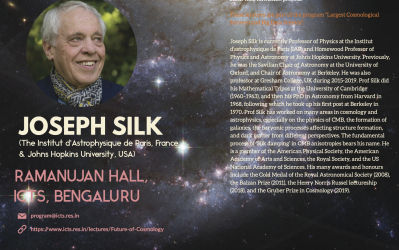Lecture 1: Monday, 01 May 2023 at 16:00 hrs
Title: The Future of Cosmology
Abstract: I will review the prospects for future progress in cosmology. I will give examples of futuristic lunar experiments. One seeks the dark ages signature via low-frequency radio astronomy on the far side of the Moon, This could provide a robust probe of our cosmic origins via inflation. Such concepts could be implemented in the coming decades of lunar exploration.
Lecture 2: Tuesday, 02 May 2023 at 16:00 hrs
Title: From nuclear star clusters to intermediate-mass black holes
Abstract: Nuclear star clusters can be the missing link in the formation of massive black holes. Million solar mass black holes can form within 100 Myr in the heaviest and most compact nuclear star clusters. There are potential gravitational-wave signatures of the massive black-hole formation process.
About the speaker: Joseph Silk is currently Professor of Physics at the Institut d'astrophysique de Paris (IAP) and Homewood Professor of Physics and Astronomy at Johns Hopkins University. Previously, he was the Savilian Chair of Astronomy at the University of Oxford, and Chair of Astronomy at Berkeley. He was also professor at Gresham College, UK during 2015-2019. Prof Silk did his Mathematical Tripos at the University of Cambridge (1960–1963), and then his PhD in Astronomy from Harvard in 1968, following which he took up his first post at Berkeley in 1970. Prof Silk has worked on many areas in cosmology and astrophysics, especially on the physics of CMB, the formation of galaxies, the baryonic processes affecting structure formation, and dark matter from different perspectives. The fundamental process of ‘Silk damping’ in CMB anisotropies bears his name. He is a member of the American Physical Society, the American Academy of Arts and Sciences, the Royal Society, and the US National Academy of Sciences. His many awards and honours include the Gold Medal of the Royal Astronomical Society (2008), the Balzan Prize (2011), the Henry Norris Russel lectureship (2018), and the Gruber Prize in Cosmology (2019).
This lecture is part of the program "Largest Cosmological Surveys and Big Data Science".


